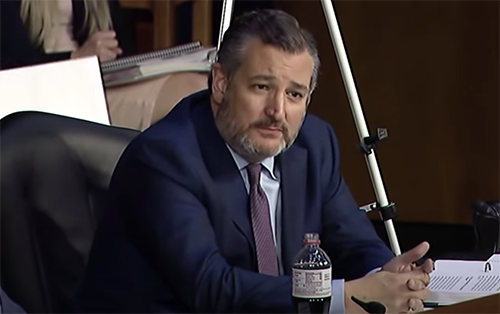Sen. Cruz On Judge Ketanji Brown Jackson: ‘I See A Record Of Activism And Advocacy’
 During the initial round of questioning in the confirmation hearing for Judge Ketanji Brown Jackson, as member of the Senate Judiciary Committee and Ranking Member of the Subcommittee on The Constitution, I highlighted the judge’s comments about the 1619 Project, Critical Race Theory, her leadership on the board of Georgetown Day School—which teaches Critical Race Theory—and her record of giving child pornographers sentences far below what prosecutors have asked for in those cases. Watch the full round of questioning here. Excerpts are included below:
During the initial round of questioning in the confirmation hearing for Judge Ketanji Brown Jackson, as member of the Senate Judiciary Committee and Ranking Member of the Subcommittee on The Constitution, I highlighted the judge’s comments about the 1619 Project, Critical Race Theory, her leadership on the board of Georgetown Day School—which teaches Critical Race Theory—and her record of giving child pornographers sentences far below what prosecutors have asked for in those cases. Watch the full round of questioning here. Excerpts are included below:
WATCH: Sen. Cruz’s Full Q&A with Judge Ketanji Brown Jackson on Day 2 of Senate Judiciary Confirmation Hearing
Sen. Cruz asked Judge Jackson about a speech she gave in 2020 where she hailed the 1619 Project and its author, Nikole Hannah-Jones:
“As I read your speech at the University of Michigan Law School, however, there was a portion that surprised me. And in particular, in that speech, you reference the work of quote, ‘acclaimed investigative journalist Nikole Hannah-Jones’ and her, and again, this is a quote from the speech ‘provocative thesis that the America that was born in 1776 was not the perfect union that it purported to be.’
“And indeed, Miss Hannah Jones in her 1619 Project describes the central thesis of the 1619 Project, which The New York Times laid out as a revisionist look of history, revising American history, and Miss Hannah-Jones described her central thesis as quote, ‘one of the primary reasons the colonists decided to declare independence was because they wanted to protect the institution of slavery.’
“Now that claim is a highly contested historical claim. Do you agree with Miss Hannah-Jones that one of the primary reasons the colonists decided to declare independence is because they wanted to protect the institution of slavery?
Sen. Cruz continued, asking Judge Jackson if she was aware that the 1619 Project has been refuted by historians and that The New York Times has had to issue multiple corrections:
“So are you aware that since the 1619 Project came out that it has been roundly refuted by very respected historians, including Gordon Wood of Brown University, including James McPherson, of Princeton University. McPherson called it a quote, ‘very unbalanced one sided account which lacks content and perspective.’ And indeed, it was so thoroughly refuted that The New York Times quietly altered the digital version to remove references to 1619 as the year of America's true founding, and the moment America began, were you aware of that?
On Critical Race Theory and Judge Jackson’s position on the board of Georgetown Day School, Sen. Cruz asked:
So Judge Jackson, all of us will agree that no one should be discriminated against because of race. When you just testified a minute ago that you didn't know if Critical Race Theory was taught in K-12, I will confess I find that statement a little hard to reconcile with the public record because if you look at the Georgetown Day School’s curriculum, it is filled and overflowing with Critical Race Theory—that among the books that are either assigned or recommended, they include Critical Race Theory: An Introduction. They include The End of Policing, an advocacy for abolishing police. They include How To Be An Anti-Racist by Ibram Kendi. They include literally stacks and stacks of books, and I'll tell you two of the ones that were most stunning. They include a book called Antiracist Baby by Ibram Kendi, and they’re portions of this book that I find really quite remarkable. One portion of the book says babies are taught to be racist or anti-racist, there is no neutrality. Another portion of the book they recommend to babies, ‘Confess when being racist.’ Now this is a book that is taught at Georgetown Day School to students in Pre-K through second grade, so four through seven years old. Do you agree with this book that is being taught with kids that the babies are racist?
Sen. Cruz pressed her further on Critical Race Theory, specifically at Georgetown Day School, asking:
Another book that is on the summer reading for third through fifth grade is a book called Stamped (For Kids) again by Ibram Kendi. I read the entirety of the book and I will say it is an astonishing book. On page 33 it asks the question, ‘Can we send white people back to Europe?’ That's on 33. That's what's being given to eight and nine year olds. It also on page 115 says ‘The idea that we should pretend not to see racism is connected to the idea that we should pretend not to see color. It's called color blindness.’ Skipping ahead, ‘Here's what's wrong with this. It's ridiculous. Skin color is something we all absolutely see.’ Skipping ahead. ‘So to pretend not to see color is pretty convenient if you don't actually want to stamp out racism in the first place.’ Now, what this book argues for is the exact opposite of what Dr. King spoke about on the floor of the Lincoln Memorial, and are you comfortable with these ideas being taught to children as young as four in respect to the first book and as young as eight, nine in respect to the second book?
On Judge Jackson’s 1996 note in Harvard Law Review examining whether sex offender statutes are punitive or preventative, Sen. Cruz asked:
“I'll confess, Judge Jackson…look, as I listened to your testimony, I believe you are someone who is compassionate. I believe you care for children, obviously your children and other children. But I also see a record of activism and advocacy as it concerns sexual predators that stems back decades and that is concerning. You wrote your note on the Harvard Law Review on sex crimes. Your note is your major academic work on the Law Review and yours is entitled ‘Prevention versus Punishment: Towards a principled distinction in the restraint of released sex offenders.’
“And in it, you argue, and I quote, ‘a recent spate of legislation purports to regulate released sex offenders by requiring them to register with local law enforcement officials, notify community members of their presence, undergo DNA testing, and submit to civil commitment for an indefinite term. Although many courts and commentators herald these laws as valid regulatory measures, others reject them as punitive enactments that violate the rights of individuals who have already been sanctioned for their crimes. Under existing doctrine, the constitutionality of sex offender statutes depends upon their characterization as essentially preventative rather than punitive.’ And what you go on to explain is that if they're viewed as punitive, they are unconstitutional. If they're viewed as preventative, they are not. And throughout the course of your note, you argue they should be viewed as punitive and therefore, unconstitutional. Indeed, in the second to last page, you go through each of those four categories. You say requirements that sex offenders register may or may not be unconstitutional, depending upon whether, quote, ‘In which sex offenders have no privacy right in registration information or blood samples.’ So you suggest that may or may not be constitutional, you raise doubts about it. And then you raise very significant doubts about community notification. And you heavily suggest that civil commitment for sexual predators is unconstitutional. Do you still agree with the sentiments you expressed in your law school note?
Sen. Cruz also asked Judge Jackson about her comments on child pornography offenders:
“So when you were Vice Chairman of the Sentencing Commission, you expressed significant concerns that the White House has argued that your quotes were taken out of context. So I want to provide the full context of your quote, because you said ‘Yes. I want to ask you about the means by which we can distinguish more or less serious offenders. I know that all of you sort of touched on that. Mr. Fottrell, you talked about going from singular to one on one to group experience. And I am just wondering if there's some sort of inevitable and natural progression from one stage to the other such that you could say that the least serious offenders are in the singular experience stage? And I guess my thought is in looking at some of the testimony that other people will have later in the day, I was surprised at some of the testimony with respect to the motivation of offenders’— and we're talking about child pornography offenders—‘and that there are people who get involved with this kind of activity, who may not be pedophiles, and who may not be necessarily interested really in the child pornography but have other motivations with respect to the use of technology, and being in the group. And you know, here are lots of reasons perhaps why people might engage in this. And so I'm wondering whether you could say that there is a—that there could be a less serious child pornography offender, who is engaging in the type of conduct in the group experience level, because their motivation is the challenge or to use the technology. They're very sophisticated technologically, but they aren't necessarily that interested in the child pornography piece of it.’ Now, I find that a pretty remarkable argument that people in possession of child pornography, are not actually interested in the child porn, they're not pedophiles, they're just interested in technology. Is that, and I wanted to provide the whole quote, because the White House said that portions of this were used out of context. So this is your entire quote. Do you agree with that sentiment that there is some meaningful population of people who have child pornography but are not in fact pedophiles or getting satisfaction from it?
Sen. Cruz continued, asking Judge Jackson why she consistently gave child pornagraphers lower sentences than what prosecutors asked for:
“Let's take a look at your actual sentencing. And you've had 10 different cases involving child pornography. These are the cases, there are two U.S. vs. Buttry and U.S. vs. Cane for which the government did not make a recommendation. And you said earlier, when Chairman Durbin was trying to preempt this line of attack, you said it's a sickening and egregious crime, which I very much agree with. And you said the guidelines lean to extreme departures. Okay. Let's look at what the prosecutors are asking for it. And I would note that this was in the District of Columbia where prosecutors are far more liberal than many of the prosecutors in this country. And in every case in which, so United States v. Hess there was a mandatory statutory minimum of 60 months and you imposed 60 months because you had no discretion. In United States v. Nickerson, there was a mutual agreement of the parties to 120 months and that's what you imposed. In every other case, United States v. Chazin, the prosecutor asked for 78 to 97 months. You imposed 28 months—28 months is a 64% reduction. In the United States v. Cooper, the prosecutor asked for 72 months. You imposed 60 months. That was a 17% reduction. In United States v. Downs, the prosecutor asked for 70 months. You imposed 60. That was a 14% reduction. In United States v. Hawkins, the prosecutor asked for 24 months, you imposed three months. That was an 88% reduction. In United States v. Savage, the prosecutor asked for 49 months, you imposed 37. That was a 24% reduction. In the United States v. Stewart, the prosecutor asked for 97 months. You imposed 57. That was a 41% reduction. Every single case, 100% of them, when prosecutors came before you with child pornography cases, you sentenced the offender to substantially below, not just the guidelines which are way higher, but what the prosecutor asked for on average of these cases—47.2% less. Now, you said you made sure the voice of the children was heard. Do you believe in a case like United States v. Hawkins, where the prosecutor asked for 24 months and you sentenced the offender to only three months, do you believe the voice of the children is heard when 100% of the time you're sentencing those in possession of child pornography to far below what the prosecutor is asking for?
Watch Sen. Cruz’s opening remarks during day one of the confirmation hearing here.








